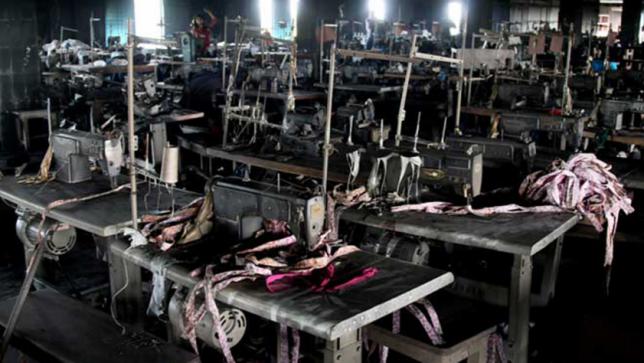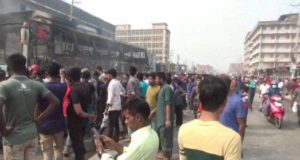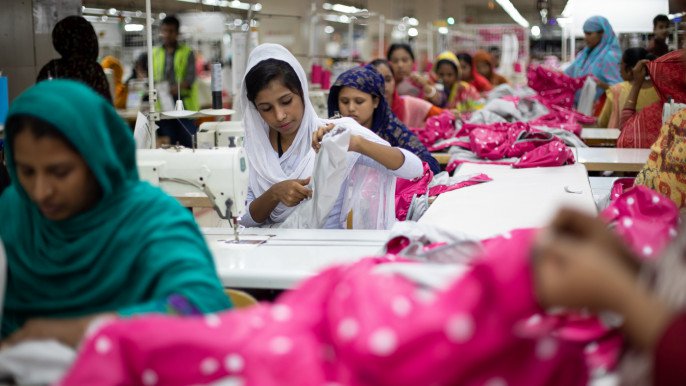Published in New Age on November 23, 2017

Victims of Tazreen Fashions fire and their families are still crying for justice even five years after the deadly fire that killed at least 112 workers and injured several hundred on November 24, 2012.
Several injured victims and relatives of the dead and missing workers said their hope for justice was fading day by day as the trial process failed to make any significant progress over the last five years.
Dhaka court officials concerned said only seven prosecution witnesses were so far examined in a case filed by police since 13 accused were indicted on September 3, 2015.
The accused include Tazreen Fashions managing director Delwar Hossain, his wife Mahmuda Akter, also its chairperson, and 11 other staff of the apparel factory.
Of the accused, factory quality manager Shahiduzzaman Dulal, production manager Mobarak Hossain Manju, guard Rana and loader Shamim Miah are still in hiding while the rest nine – Delwar, his wife Mahmuda, manager (admin) Dulal Uddin, engineer M Mahbubul Morshed, store in-charges Md Hamidul Islam and Al Amin, security in-charges Al Amin and Anisur Rahman and factory manager Abdur Razzak – are on bail, according to sources in court.
Labour rights campaigners have alleged that the government did not give proper attention to the sensitive case as they failed to present prosecution witnesses for examination.
They say that only seven witnesses, out of 104, were produced in court on four scheduled days, out of 19 dates, for recording testimony of prosecution witnesses, since the trial commenced.
The campaigners have alleged that the case is still pending with Dhaka First Additional District and Sessions Judges Court due to non-appearance of prosecution witnesses, negligence of prosecution lawyers and few others complexities.
Kazi Shahnara Yeasmin, additional public prosecutor of the court, said that the case did not get momentum at the trial stage as the witnesses could not be found in their addresses given in the charge sheet.
‘The trial is not proceeding as the witnesses are not turning up in court despite repeated summons,’ the additional PP told New Age on Wednesday.
Two cases were filed following the incident that left 112 workers, mostly women, killed, 10 missing and over 1,000 injured.
One of them was filed by Ashulia police sub-inspector Md Khairul Islam after the incident and another case was filed in May 2013 by Motikul Islam, sibling of a dead worker of the factory, accusing factory owners and others on charge of killing workers.
Criminal Investigation Department of police submitted charge sheet in the case filed by police on December 22, 2013, naming 104 prosecution witnesses, mostly workers of the factory.
The accused were charged with culpable homicide not amounting to murder under Section 304 of the Penal Code, causing death by negligence under Section 304A, voluntarily causing hurt under Section 323, mischief causing damage under Section 427 and mischief by fire or explosive substance with intent to destroy building under Section 436 of the code.
The offences warrant various punishments including imprisonment for varying terms ranging from one year to life term.
According to the charges, Delwar and his wife constructed the building on a faulty plan and illegally used the ground floor walkway as a warehouse that caused the massive disaster.
There was no fire exit in the building, although it was mandatory in accordance with Bangladesh Labour Act, the charges said.
The charges said that about 7:00pm on November 24, 2012 the workers tried to run out from the apparel factory hearing the fire alarm but they could not get out as the main gate was locked.
The security people tried to convince the workers that firefighting manoeuvres was going on on the ground floor.
The case filed by dead victim Rehana’s brother was yet to see any progress.
‘I want justice,’ Motikul told New Age on Wednesday over phone and complained that a vested quarter continued to pressure him for withdrawing the case.
Labour rights lawyers have asked the government for immediate end of the trial process of the cases to ensure justice for the victims.
 CPD RMG Study Stitching a better future for Bangladesh
CPD RMG Study Stitching a better future for Bangladesh



